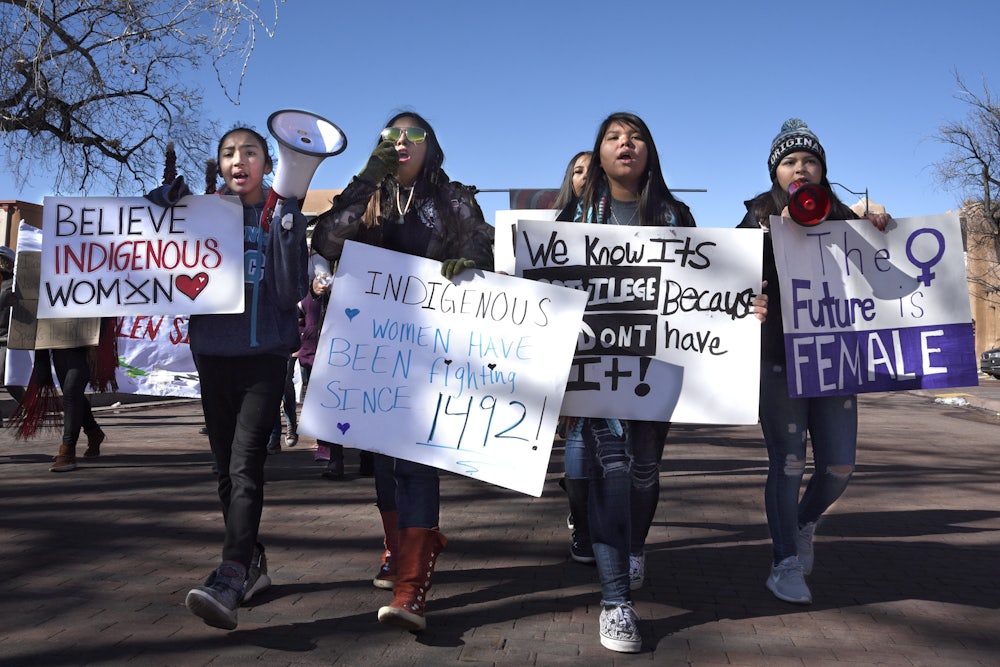Across America, justice is not being served because of long-standing laws and rulings that weakened tribal courts. If a Native woman in Indian Country is sexually assaulted by a non-Indian perpetrator, tribal courts are unable to prosecute the crime. The lack of jurisdiction has effectively allowed non-Native offenders to act with immunity, leaving Native women especially vulnerable to violence. “The [United States] government that colonized them has told these local governments that they are not fit to protect their own,” said Elizabeth Reese, an assistant professor at Stanford Law School and an expert on American Indian tribal law.
But in a step toward justice for a historically neglected population, Congress this month introduced legislation that addresses some of these wrongs. The bill, a reauthorization of the Violence Against Women Act, includes a comprehensive “tribal title” that would restore tribal jurisdiction for additional crimes committed by non-Native offenders, such as sexual assault, sex trafficking, stalking, and child abuse, as well as obstructing justice and assaulting tribal law enforcement officers. Crucially, the bill appears to have sufficient Republican support to become law.
The problem Congress is seeking to address arose 34 years ago, when the Supreme Court ruled that tribes lack jurisdiction over crimes committed by non-Indians on tribal lands, and instead handed that authority to federal or state governments. Intimate partner violence flourished, in part because of the lack of tribal court jurisdiction to prosecute even the most flagrant crimes by non-Native offenders.
In 2013, Congress approved an authorization of the Violence Against Women Act that included a provision restoring tribal authority to prosecute crimes of domestic violence by non-Native perpetrators. But criminal activity doesn’t often happen in a vacuum, and tribes were unable to prosecute other, related crimes, such as sexual assault, child abuse, and obstructing justice. Tribal governments and law enforcement, which are often struggling financially, have still been unable to carry out justice on their own lands, even as Native women face disproportionately high levels of domestic and sexual violence.
The stats that bear this out are horrific. More than 84 percent of Native women have experienced violence in their lifetime, including over 56 percent who have experienced sexual violence, with 96 percent of these victims experiencing violence from an interracial perpetrator, according to a 2016 National Institute of Justice report. The same report found that more than 55 percent of Native women have experienced physical violence from an intimate partner, with 90 percent of these victims having experienced physical violence from a non-Indian intimate partner. In the United States, homicide is the third-leading cause of death among Native women, and the murder rate among Native women is almost three times that of non-Hispanic white women. Nearly half of all Native women have been stalked, and 89 percent of those victims have experienced stalking by a non-Native perpetrator. Although there is not as much data on violence against tribal children, one 2014 report found that tribal children develop post-traumatic stress disorder at the same rate as veterans returning from Iraq and Afghanistan.
The 2013 authorization of the Violence Against Women Act, a measure enshrining legal protections for victims of sexual and domestic violence, expired nearly three years ago. Although the new reauthorization does not include some priorities from both parties, it expands protections for some of the most vulnerable women and children, including Native women.
“I wanted to come to a solution that won’t just be a political talking point for one side or the other, but a bill that can gain bipartisan support needed to pass the Senate and truly deliver for my fellow survivors of these life-altering abuses,” Republican Senator Joni Ernst said in a press conference announcing the compromise legislation.
The legislation needs to garner 60 votes to advance in the Senate, with at least 10 Republicans needed to support it in order for it to pass. The bill currently has 11 Republican sponsors.
Because tribes were only able to prosecute such a narrow set of crimes under the 2013 authorization, that meant that concurrent crimes—a child being abused in a household with domestic violence, for example, or an assault against a law enforcement officer trying to arrest a perpetrator—could not be addressed. The 2022 expansion reflects the fact that these crimes don’t happen in isolation. “Tribes, like any other government, have to have broad authority over conduct, so that they’re able to respond accordingly to the realities of the situation, instead of having to feel like their hands are constantly tied behind their back,” Reese told The New Republic.
Moreover, the 2022 reauthorization would remove the “sufficient ties” requirement, a restriction that limits tribal criminal jurisdiction to non-Indian people who reside or are employed on tribal lands, or are the spouses or partners of a member of a tribe or a resident of Indian Country. This means that a perpetrator can be prosecuted even if they have no connection to the victim or the tribal lands, both simplifying the investigation process and widening the pool of who can be prosecuted for violent crimes.
The bill also excludes a provision to close the “boyfriend loophole,” a measure to bar dating partners from owning a gun if convicted of domestic abuse, which was opposed by the National Rifle Association and Republicans. “Our bill is a compromise,” Democratic Senator Dick Durbin said. “In order to get anywhere near 60 votes, that provision became controversial, and we had to measure the remainder of the bill against that provision. It’s a tough choice, and we made the choice we thought was right.”
Despite the exclusion of some Democratic priorities, the 2022 reauthorization strengthens protections in other areas. The tribal title in the 2022 reauthorization aims to address the high levels of violence and abuse in tribes across the country. It also includes Maine and Alaska, which have not previously been covered by the Violence Against Women Act, and more fully addresses violence against Native Hawaiians. Due to restrictive language in preexisting land claim settlements in Maine, the bill needed to explicitly make the provisions of the law applicable to tribes in the state.
The tribal title also creates a pilot program to expand tribal court jurisdiction for up to 30 tribes in Alaska to prosecute violent crimes. “So many of our Native women are without any level of public safety within their villages. So what we’re trying to do is to allow for special jurisdiction on a pilot basis to allow for some level of justice through the tribal courts,” Alaska Senator Lisa Murkowski, a Republican who worked to include the tribal title in the 2022 reauthorization, told The New Republic. “It’s been a long time coming. We saw it in 2013 in how it helped protect Native women in the lower 48. We want to be able to do the same for Alaska Natives.”
Due to a confluence of factors—the timing of Alaska’s statehood; Public Law 280, a measure granting certain states extensive jurisdiction over tribal lands; and the stipulations of the Alaska Native Claims Settlement Act—Alaska tribes are treated differently from other tribes under U.S. law. Of Alaska’s 229 tribes, only the Metlakatla tribe has reservations. Because the 2013 Violence Against Women Act referred to Indian Country, it effectively excluded Alaska tribes that do not live on tribal lands. The 2022 Violence Against Women Act reauthorization aims to empower Alaska Native tribal governments to prosecute crimes, just like tribes in the contiguous U.S.
Michelle Demmert, a law and policy specialist at the Alaska Native Women’s Resource Center, told The New Republic in an interview that 40 percent of Alaska Native communities lack any form of law enforcement, and there is no centralized 911 system. Even if the state has provided law enforcement for a “hub community,” Demmert said, that could be hundreds of miles away from a victim reporting a crime. With the mitigating factors of distance, weather, and limited resources, it can take hours, days, or even weeks to respond to a call in an isolated area, and Demmert said that investigators sometimes deprioritize sexual assault cases or try to conduct investigations over the phone.
“Perpetrators know when they can get away with things,” Demmert said. According to a 2013 report by the Indian Law and Order Commission, Alaska Native women are overrepresented in the domestic violence victim population by 250 percent, and comprise 47 percent of reported rape victims in the state. There have also historically been significant delays in processing rape kits, with a backlog of thousands of unsubmitted kits that was only cleared late last year. Demmert gave the example of a young woman in a Native community who reported her rape around six years ago but only had it processed last year.
“There’s such a distrust of law enforcement as a result of this,” Demmert said. The pilot project established by the 2022 reauthorization would provide more resources to build infrastructure for a tribal police force or court system, hopefully leading to greater collaboration between tribes and the state and to more tribes eventually taking advantage of the law down the line.
Demmert said it was important to note that the pilot program was “complementary” to existing law; it does not repeal Public Law 280, nor does it create Indian Country. “It doesn’t take away any rights or responsibilities of the state. And it doesn’t place any further burdens on the state. It provides more resources within the state,” Demmert said. “It’s about providing more resources to communities that historically have been without any sort of law enforcement presence or judicial system and have lacked justice for far too long.”
The expansion of tribal jurisdiction included in a 2013 Violence Against Women Act authorization had started as a pilot project that was later able to be adopted by more tribes. A 2018 report by the National Congress of American Indians found that tribes implementing the special domestic violence criminal jurisdiction established by the 2013 bill had reported 143 arrests of 128 non-Indian abusers, leading to 74 convictions and five acquittals. According to testimony by a Justice Department official last December, 28 tribes have reported to the National Congress of American Indians that they have implemented the special domestic violence criminal jurisdiction.
Democratic Senator Brian Schatz, the chair of the Indian Affairs Committee who worked on the tribal title of the 2022 reauthorization with Murkowski, told The New Republic that there was now eight years of experience to prove the benefit of expanding jurisdiction. The 2022 bill, like the 2013 bill, ensures defendants will receive the same protection as they would in nontribal courts, a concern for opponents of the earlier bill.
“The parade of horribles that was the fear among opponents never materialized,” Schatz said, referring to opposition to the 2013 law. “This has kept people safe on tribal land across the country.”
Implementing justice and building the infrastructure to do so can be costly, and those expenses can be prohibitive for tribes that might otherwise prosecute crimes under their expanded authority from the 2013 Violence Against Women Act. “It’s not that tribes don’t want to, and they’re fully capable—tribes have the desire and the capacity, but what they don’t have is the money,” Reese said. She praised the provisions in the new bill pertaining to grant funding. The 2022 reauthorization would increase the grant program for implementation from $5 billion to $25 billion per year and create a mechanism for tribes to receive reimbursements from the Justice Department associated with the expanded jurisdiction. “It creates a way for tribes to basically send the attorney general receipts,” Reese said.
Reese said that she saw the provisions in the 2022 reauthorization as “a big step,” but only one in a series of steps to address the violence against Native women and restore tribal communities with the authority to prosecute crimes on their land.
“What has happened with Native women is the result of systemically ignoring, disrespecting, and disregarding a group of people and their own authority to protect themselves,” Reese said. “Doing that so deeply and for so long isn’t going to be fixed simply or quickly.”






